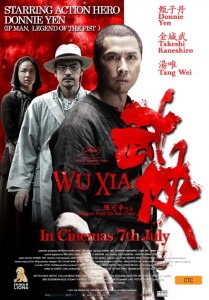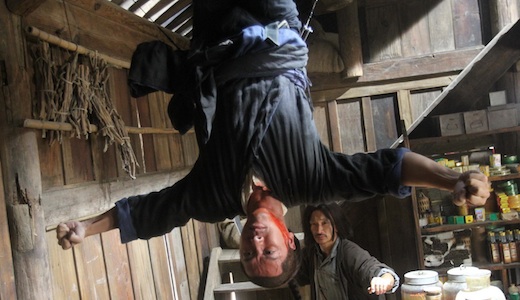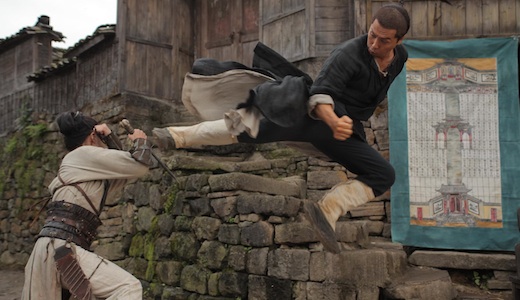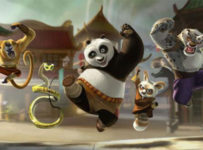 Premiering at the Cannes Film Festival’s Midnight Screenings earlier this year, Wu Xia (aka Dragon or Swordsman) comes from a long line of martial arts films (wuxia films) from which it takes its name. Peter Ho-sun Chan’s first film as a director since 2007’s spectacularly staged Warlords, with Jet Li and Andy Lau, Wu Xia has been the subject of a great deal of advanced buzz and pre-publicity. Indeed, it’s star Donnie Yen and director Chan presided over the opening of a giant billboard that broke the Guinness Book of World Records for its size of 3591 square meters, a title previously held by Michael Jackson promotion. Yet in a genre that has existed since at least the 1920s on screen, and has a history that stretches back even further in China, it is often difficult to bring something new to the table.
Premiering at the Cannes Film Festival’s Midnight Screenings earlier this year, Wu Xia (aka Dragon or Swordsman) comes from a long line of martial arts films (wuxia films) from which it takes its name. Peter Ho-sun Chan’s first film as a director since 2007’s spectacularly staged Warlords, with Jet Li and Andy Lau, Wu Xia has been the subject of a great deal of advanced buzz and pre-publicity. Indeed, it’s star Donnie Yen and director Chan presided over the opening of a giant billboard that broke the Guinness Book of World Records for its size of 3591 square meters, a title previously held by Michael Jackson promotion. Yet in a genre that has existed since at least the 1920s on screen, and has a history that stretches back even further in China, it is often difficult to bring something new to the table.
It is 1917, and papermaker Liu Jinxi (Donnie Yen, The Lost Bladesman) lives a quiet life with his wife Ayu (Tang Wei) and children. However, when two notorious bandits attack the general store, forcing Liu to accidentally kill them in self-defence, it attracts the attention of detective Xu Baijiu (Takeshi Kaneshiro, Red Cliff). While Liu professes that he is just an average citizen, Xu suspects that he is something more than he claims to be, and sets out to find the truth behind Liu’s identity.
If Wu Xia were a weapon, it would not be a blunt object that whacks you over the back of the head with its less-than-subtle stylings. Rather it is a finely-crafted blade, inlaid with intricate details that reveal themselves as it is slowly unsheathed. Donnie Yen has been taking the cheques on recent efforts Legend of the Fist: The Return of Chen Zhen and The Lost Bladesman lately and he and director Chan both return to stylish form in what may be one of the more intriguing martial arts films of the last decade. The film begins with a mystery, and the first act of the film plays out much like an episode of CSI. Indeed, CG shots of the interior organs and we travel along the capillaries are wholly reminiscent of those investigative dramas, and its insertion into the period wuxia genre not only works, but is a breath of fresh air in a sometimes predictable set of narratives. As Xu’s obsession with Liu grows, the film takes a slow twist into psychological thriller territory, turning the critical eye on Kaneshiro’s character and casting doubt on his own hypotheses. By the time the ‘prestige’ of the film rolls around, Chan has us in the palm of his hand. That the film descends into action territory at this point is no fluke, but there is nothing standard about this action.
Chan brings a brutality, or more accurately a closeness, to the action, and like the filtered versions of martial arts seen in the Bourne films or Casino Royale, every damn punch and kick can be felt. This action is used with incredible restraint, especially in the first half of the film, so when it comes the impact is all the greater. Yen, who has openly stated that acting is not his strength, proves that he has done himself a discredit in a performance that is often subtle, never betraying his true emotions until the end. Kaneshiro is as reliable as ever, having first come to international attention in Zhang Yimou’s The House of Flying Daggers, and playing a wholly extraordinary character here. He is the obsessive and brilliant Law & Order/CSI/Sherlock Holmes detective displaced from the slick modern settings and very much the fish out of water in early 20th century China, but the character is entirely his own as well. Wu Xia is undoubtedly designed to appeal to an international martial arts audience, but its twists, turns and kicks serve to make this a classic of the genre.

Wu Xia was released in Australia on 7 July from China Lion.
If you care about seeing Asian cinema in Australia on the big screen, we encourage you to go out and support the regular screenings at selected Event Cinemas and the regular Asian Cinema screenings at Hoyts Cinemas. Increasingly they are day-and-date with their Chinese release, so there are no excuses for that ‘other method’ of acquiring them.






No Responses